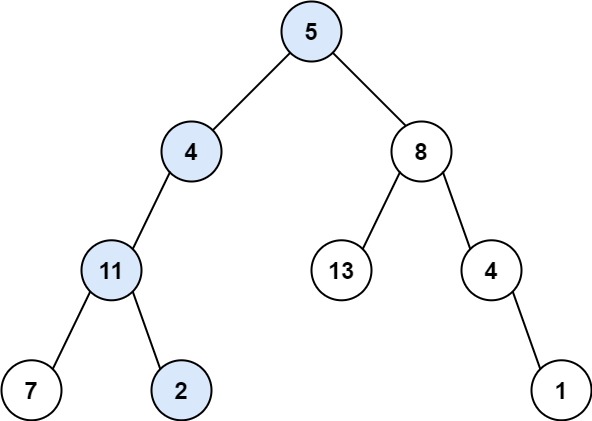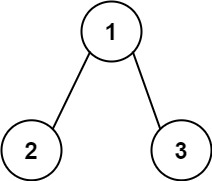Path Sum
description
Given the root of a binary tree and an integer targetSum, return true if the tree has a root-to-leaf path such that adding up all the values along the path equals targetSum.
A leaf is a node with no children.
Example 1:

Input: root = [5,4,8,11,null,13,4,7,2,null,null,null,1], targetSum = 22 Output: true Explanation: The root-to-leaf path with the target sum is shown.
Example 2:

Input: root = [1,2,3], targetSum = 5 Output: false Explanation: There are two root-to-leaf paths in the tree: (1 --> 2): The sum is 3. (1 --> 3): The sum is 4. There is no root-to-leaf path with sum = 5.
Example 3:
Input: root = [], targetSum = 0 Output: false Explanation: Since the tree is empty, there are no root-to-leaf paths.
Constraints:
- The number of nodes in the tree is in the range
[0, 5000]. -1000 <= Node.val <= 1000-1000 <= targetSum <= 1000
submission
// Definition for a binary tree node.
// #[derive(Debug, PartialEq, Eq)]
// pub struct TreeNode {
// pub val: i32,
// pub left: Option<Rc<RefCell<TreeNode>>>,
// pub right: Option<Rc<RefCell<TreeNode>>>,
// }
//
// impl TreeNode {
// #[inline]
// pub fn new(val: i32) -> Self {
// TreeNode {
// val,
// left: None,
// right: None
// }
// }
// }
use std::rc::Rc;
use std::cell::RefCell;
// we could solve this by iteration
// however recursion with pattern matching
// is way easier to impl.
impl Solution {
pub fn has_path_sum(root: Option<Rc<RefCell<TreeNode>>>, target_sum: i32) -> bool {
root.map_or(false, |node| {
match &*node.borrow() {
&TreeNode { val, left: None, right: None } => val == target_sum,
&TreeNode { val, ref left, ref right } => {
Self::has_path_sum(left.clone(), target_sum - val) ||
Self::has_path_sum(right.clone(), target_sum - val)
},
}
})
}
}